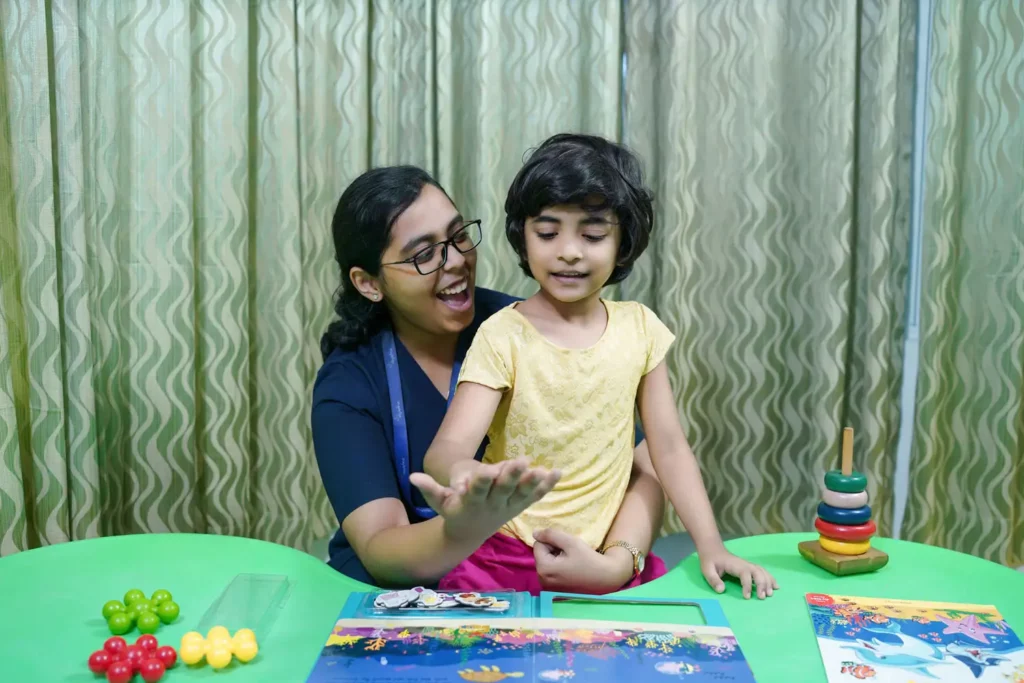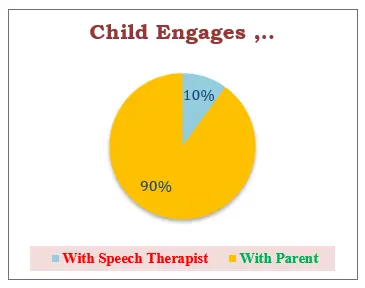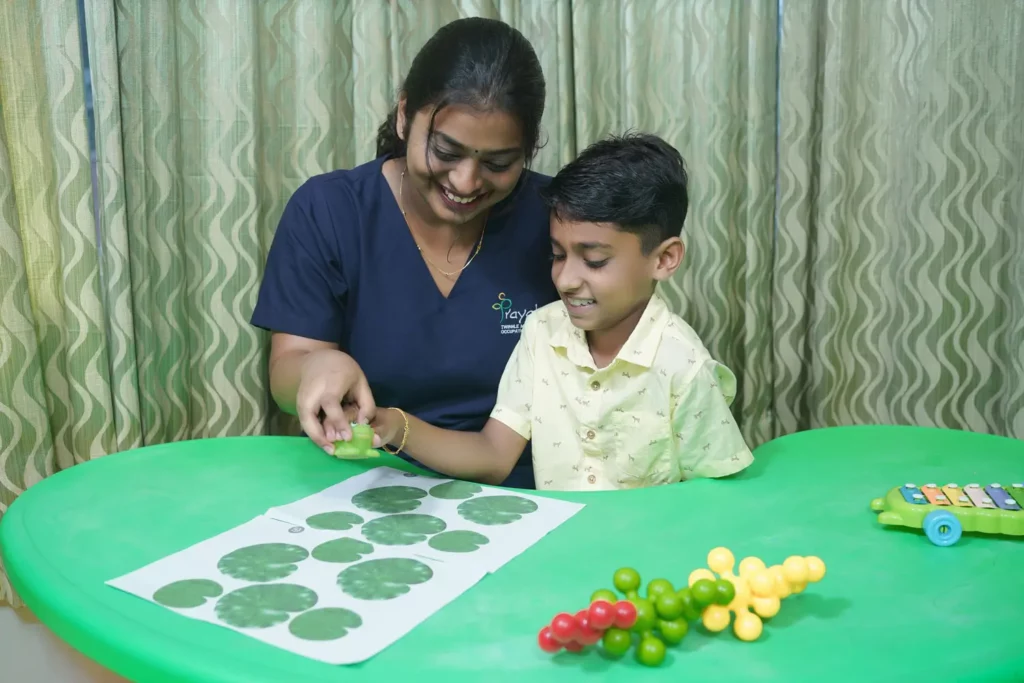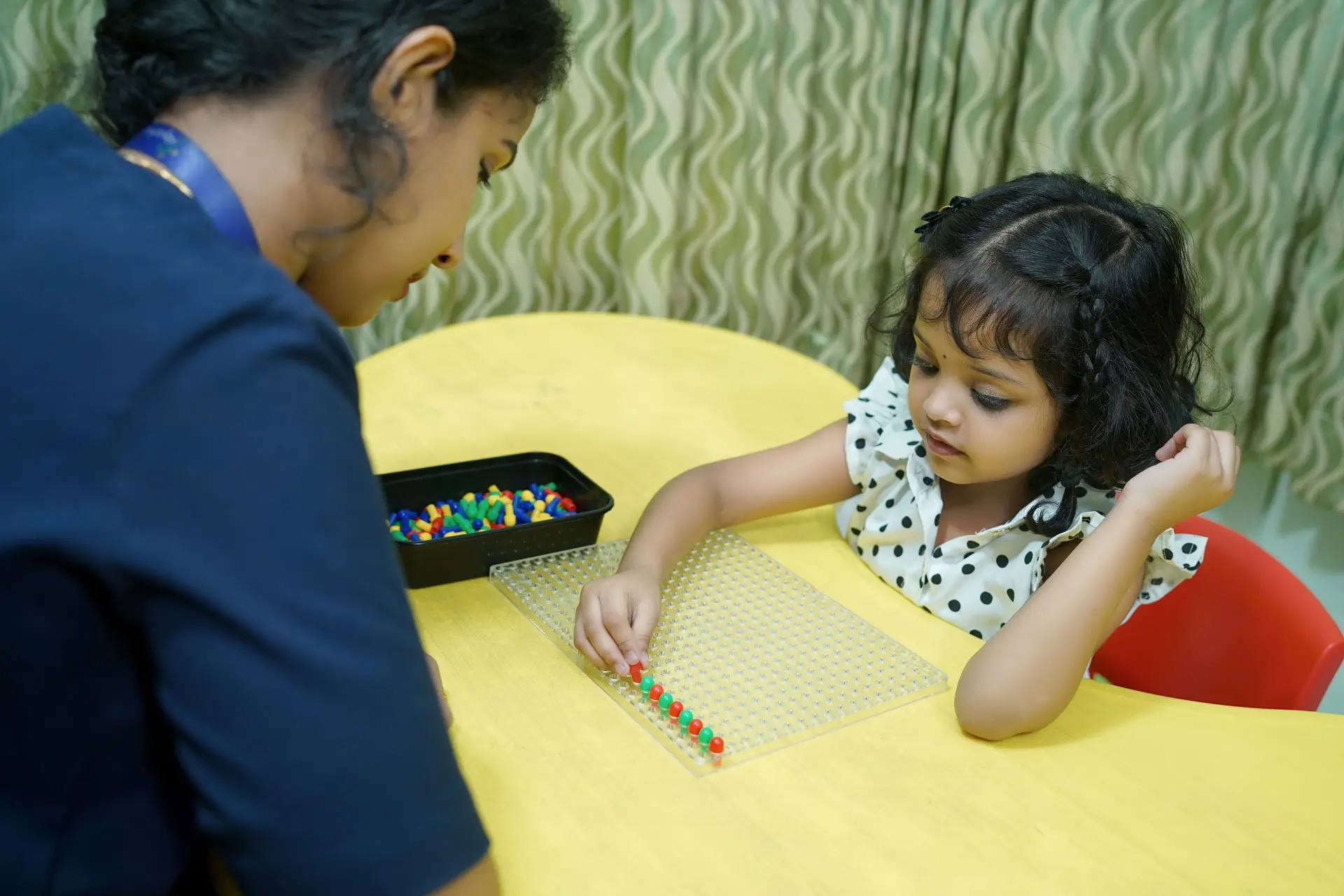
Written By
Joby Varghese, BASLP
Speech Language Pathologist
Clinically Reviewed By
Neela N J, MASLP
Speech Language Pathologist
“How long will my child need speech therapy?”
Are you a parent who is wondering how long does speech therapy take? There are many variables that can affect the duration of speech therapy. Gaining knowledge about these factors could help you comprehend the procedures involved in improving the prognosis. Here, we will examine the factors that affect the duration of speech therapy in children, hence you will know what to anticipate.
Speech and Language therapy includes techniques and activities aimed at improving overall speech, language, and communication in children with various disorders. Speech and language therapy helps children to communicate so, he/she will be able to express his/her needs, thoughts and feelings. The benefits of speech therapy includes enabling children to speak so that others will understand what is being said and prepares them for school so that they can keep up with other children in learning. It also increases self-esteem and independence.
Understanding Speech Development Milestones
Understanding speech development milestones is important for parents and caregivers, as it helps them monitor their child’s progress, spot any speech or language delays early and promote extra support or intervention. Early identification and intervention result in better outcomes of speech and language development, and to improve their communication skills.
During birth to six months of age, children startle at loud sounds, change cries for different needs and begin to babble (pa, ba, ma)
During the age of 7 months to 1 year, children respond to name calls, babble long strings of sounds like Mimi, bababa, and imitate familiar sounds and actions. They emerge their first meaningful word and say one or two words like amma, dog, hi, oh-oh etc.
By the age of 1-2 years, children start to respond to simple questions (who is that? Where is the bottle?), use new vocabulary and put two words together. They also have the correct production of syllables p, b, m, h, w in words
At the age of 2-3 years, children use about 500 intelligible words and can ask simple “wh” questions. They combine two to three words and state the function of objects.
During the age of 3-4 years, children approximately use 1500 words. They put four words together have long conversations and attempt to narrate events/tell stories.
Noticeable delay or differences in any of these milestones are the signs that your child might need speech therapy.
How Long Does Speech Therapy Take to Work
A common question from parents is how long the child should attend speech therapy. Research suggests that therapy outcomes are influenced by treatment frequency, intensity, and duration.
However, there are a few factors that contribute to the therapy duration for children which are listed below:
Factors Affecting Speech Therapy Duration
- Extent of communication difficulties (Severity) –Typically, in case of severe difficulties, children require more extended therapy experiences. For children with mild to moderate speech and language disorders, therapy may focus on improving specific speech sounds or language skills and could last for several months to a year. However, for those with severe speech and language disorders, therapy may be more intensive and long-term, extending over several years or even throughout childhood.
- Associative disorders– When children are presenting with difficulties across multiple communication areas (e.g. Children who have a diagnosis of two or more disorders), or any additional challenge (e.g. learning, attention, sensory, feeding, behavioural), in most cases, cause speech therapy to become an intensive and longer-term proposition along with the multidisciplinary team.
- The involvement of the child in the therapeutic sessions – A child’s prognosis will depend on their severity and how effectively they interact throughout therapy sessions. When a child actively participates in therapy sessions, engages in exercises, practices techniques, and shows motivation to improve, it often leads to faster progress.
- Regularity and intensity of appointments – Speech and language abilities require a tremendous deal of repetition and practice to develop and perfect. Therapy will be administered with less intensity if sessions are missed regularly. Consequently, this will affect the pace of advancement.
- Competence of your therapist– It is crucial to explain to the parents about the areas of specialization. The therapist should demonstrate their degree of expertise and knowledge.
- Adherence to a home-based routine – Supporting your child’s speech therapy activities at home provide better improvement and opportunities for the child to generalize what they have learned during the session.
- Age and developmental stage– The term “critical period” describes a window of time when a child’s brain is most open to learning language. Therefore, offering speech and language intervention to younger children (1-5 years) during this time helps in better language development.
- Goals and objectives– Each family has distinct expectations and objectives. Some may like to focus on highly specialized skills, while others might prefer more all-encompassing strategies that involve a variety of settings. Always set the goals and expectations according to the child’s current speech and language developmental level.


What to Expect During Speech Therapy
The typical structure of speech therapy often involves assessment, goal setting, intervention, and progress monitoring.
- Assessment identifies areas of difficulty and the current level of speech and language skills for setting goals.
- Goal setting establishes targets based on the assessment and the child’s receptive and expressive language age
- Intervention employs various techniques to address these goals and evaluates improvements and makes changes in therapy as needed.
Speech therapy exercises and activities vary depending on your child’s age, needs, and disorders including Language Disorders, Neurodevelopmental disorders (Autism Spectrum Disorder, Attention Deficit Hyperactivity Disorder), Fluency disorders (stuttering, cluttering), Resonance disorders (Cleft lip and palate), Articulatory disorders, Apraxia, Voice disorders etc. Speech therapy may be provided in a small group setting or one-on-one individual sessions. A Speech therapy session timing ranges around 45 minutes including parental counselling.
In speech therapy, the therapist may engage with the child through conversation, role-playing, storytelling etc. Speech interventions may vary depending on the disorder.
Therapists may utilize aids and strategies for children who are non-verbal or have limited speech. By integrating technology into speech therapy through these aids, we can enhance the effectiveness of treatment.
Therapists monitor the progress weekly or monthly by writing a progress note of targeted goals. If any goals are not achieved by the targeted period, SLPs work on the goals using different strategies. Every six months to one year after the intervention therapists do a re-evaluation to monitor the progress of therapy from the initial or previous assessments to the current stage. In addition, the therapist employs a range of speech and language strategies and prompts to achieve the targeted goals.
SLPs always ensure that the parent or caregiver participates in the session or can practice therapy at home. It is always recommended that home training must be done by parents or caregivers to achieve generalization of learned goals.


Advantages of Parent Involvement in Therapy
- Parents can assist SLPs to track progress and address concerns.
- Adding the activities of speech therapy into your child’s daily schedule, helps them achieve their goals more broadly.
- Parents can advocate for their child’s needs and participate in their treatment plan to ensure the best possible outcomes.
- Parent’s involvement throughout speech therapy sessions in the clinical setup makes them more confident and understandable on how they must use speech therapy techniques at home.
Home practice is key!
Parent’s active involvement can have a significant impact on the child’s improvement. When therapy advances, parents should be involved more quickly in the process.
When a child is diagnosed with any kind of speech or language delay their parents enter into an unfamiliar situation which was not expected by most of them. The evaluation and intervention process plan can be intimidating for the parents. Hence, they may be tempted to rely only on therapist to handle their concerns. However, when parents make an effort to understand or identify their child’s diagnosis and difficulties and become active participants in the intervention process, there are benefits not just for the child but for the parents and therapists as well.
Remember, a better prognosis is a success of the coordination and effort by therapist, child, and parent.

Conclusion
Speech therapy provides tailored intervention plans for various conditions based on a thorough formal assessment. The duration of intervention depends on the child’s age, severity, nature of the disorder, associative disorders and current health condition. A Speech Language Pathologist can support your child to become a more confident and proficient communicator. Better results and a positive prognosis are always encouraged by early access to speech therapy. Finally, but importantly, parental or caregiver involvement is critical to reach the desired outcomes. Transform your child’s speech abilities with our specialized therapy services in Kerala. Contact us today for personalized support.


